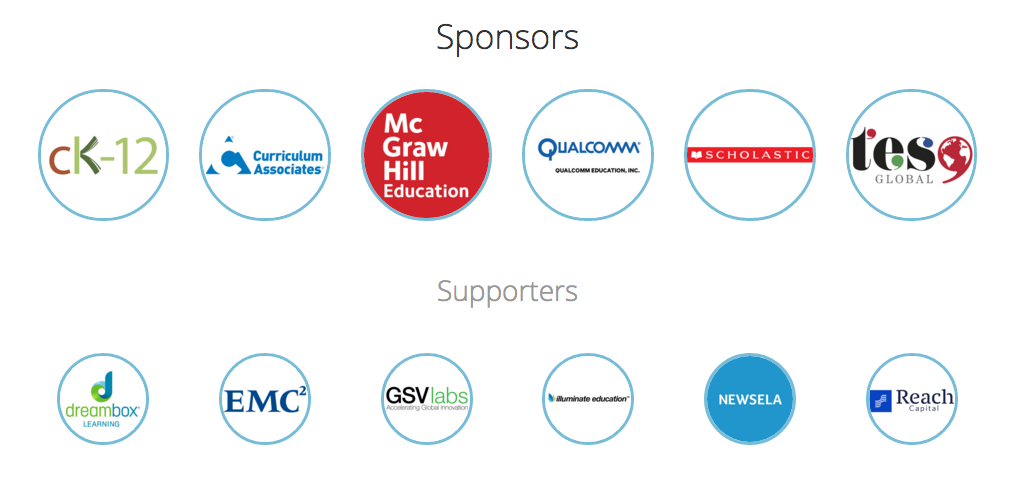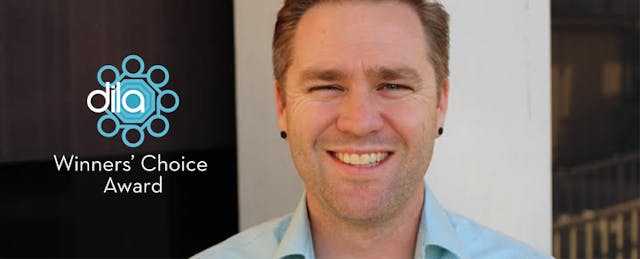You’ve read about it on EdSurge: professional development stinks. Part of the problem is that teachers’ desire to have voice and choice in the design of PD days often goes unnoticed. But talk to Steven Dunlap—2015 Digital Innovation in Learning Awards “Power to the People” winner, as well as the recipient of the “Winners’ Choice: Administrator” award, voted upon by all 17 winners of the DILAs—and you might be surprised to learn that his district is bucking that trend.
We sat down with Dunlap, Director of Innovation and Learner Engagement at Riverside Unified School District (RUSD) in southern California, to hear about a change-inducing survey his department sent out to all 1,900 RUSD teachers asking them what they wanted to learn about, the subsequent development of more than 90+ unique PD sessions and more.
Q: Thanks for sitting down with us, Steven! Back in the later summer, you brought together 1900 Riverside Unified Teachers on August 19th for professional development. But, you did it a little differently from regular, run-of-the-mill, sit-and-get PD. How did it differ?
A: I think the biggest difference was that this was really initiated by teachers. Our teachers’ association came to the district in March of 2015 and said, “We want to have a day of professional development. We want it to focus around instructional technology.” But the kicker was, they asked to have some say in what was in the PD day and they also wanted to be able to choose the sessions they wanted to attend. That’s awesome, but a huge logistical nightmare that luckily came off and went really well.
The biggest difference was the fact that it was initiated by teachers. They asked for it, and to help, we have a very supportive Cabinet and high-level administrators in the district. They really made resources available to make it happen and make it successful.
This sounds like a huge endeavor, but I imagine there were some snags along the way.
I think probably the biggest challenge was giving 1,900 teachers the ability to choose and direct the learning that they wanted. Again, it’s an amazing thing to happen, but to see that come to life is kind of crazy. Trying to meet all the different needs expressed in the survey… to try and take all that data and compile it into the 80, 90 sessions that we offered on that day was a difficult part—to try and meet all of those needs. We didn’t meet every single need that came up in the survey, but we really tried to get those broad concepts that people were asking for PD on. We also gave them the choice on that day to then choose what sessions they wanted to attend—what’s going to improve your professional practice? we said.
This is all well and good--sure, one powerful day of PD can better the start to someone's school year. But how are you ensuring that the impact of that one day lasts?
Ok, there's a couple of things. One, for years, our PD model has been that traditional model of coming in and you get what the district wants you to know. We still have elements of that that hang around our Instructional Services department--and for good reason! They’re trying to teach teachers about new standards and instructional strategies, like how we address Common Core and the Next Generation Science Standards. But with that day that we had, they’re also starting to see the shift in how we talk about to teachers about PD, and tapping into what they want to know and learn about. Our day-to-day PD is starting to shift.
The other thing is that before August 19th, we had every session presenter screencast their presentation ahead of time. We made a very loose online course and put it up on our learning management system. Every teacher in the district has access to it. They can go back to a session that they were involved with and re-watch the content, or if they heard about a session that a colleague of theirs went to, they can go check that session out, get some basic information, and contact that presenter because most of our presenters were teachers within the district. There’s good collaboration going on beyond August 19th.
Lastly, we’re currently involved with the Gates Foundation in looking at their PD Redesign Grant, and how we think about PD differently. The district is starting to take that challenge on.
You won the Power to the People Award this year at the Digital Innovation in Learning Awards, which awards administrators who empower teachers, students and other administrators to take on leadership roles and participate actively in system-wide innovation. Do you have any advice for other administrators, when it comes to launching districtwide initiatives with teacher input?
When it comes to empowering people and giving them control over their learning, it comes down to listening. In education, we’re not always that good at really listening to what our teachers are asking for, what our students are asking for, what our parents are asking for. If it can’t happen exactly the way someone wants it to happen, how can we get there? How can we make it happen to some degree? How can we start shifting the way we think about professional development?
A lot of times, we go into situations and we listen for what we want to hear. We have preconceived notions of what’s going to happen. But really what it comes down to is just listening, and taking action on what people are telling you. Those things may not be financially feasible or logistically feasible, but it’s about going into that situation being very open and very willing to listen and problem solve.
EDITOR'S NOTE: Interested in applying for the 2016 Digital Innovation in Learning Awards? Check back here in the early spring for all the details!



